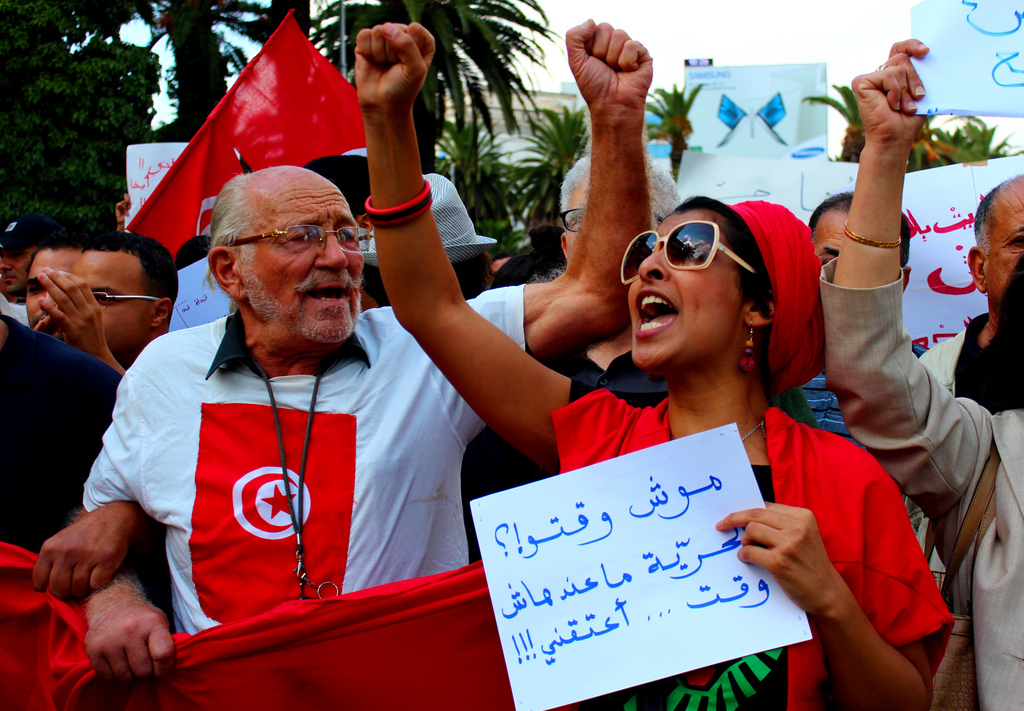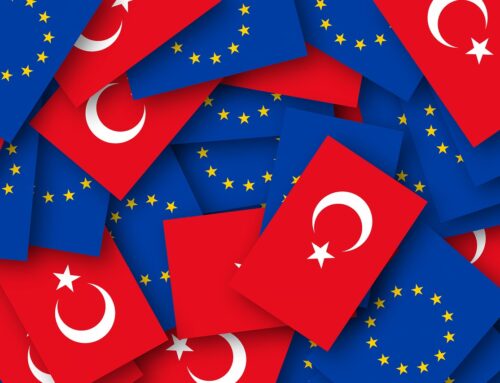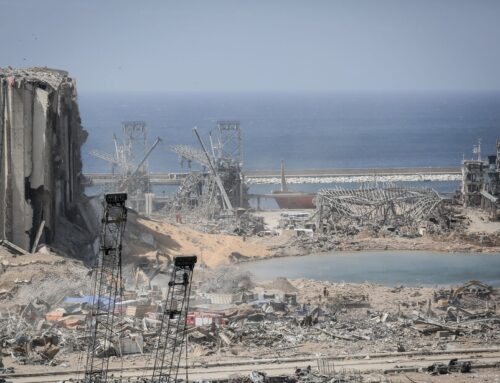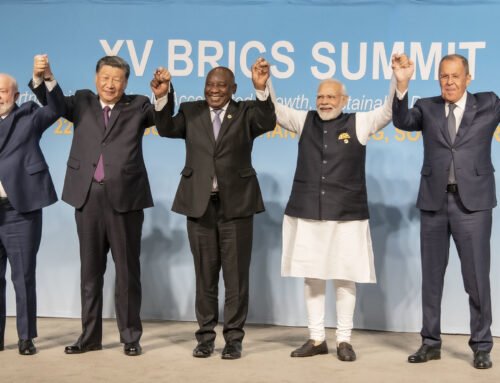Tunezja-Amine GHRABI
Autor foto: Amine Ghrabi

Tunisia: the first success story of the Arab Spring?
May 23, 2014
Author: Jędrzej Czerep




Tunezja-Amine GHRABI
Autor foto: Amine Ghrabi
Tunisia: the first success story of the Arab Spring?
Author: Jędrzej Czerep
Published: May 23, 2014
On May 1 2014, the Tunisian Constituent Assembly passed a new electoral law. After the debate deputies – by one vote only – decided not to exclude officials from the Zine alAbidine Ben Ali regime from the possibility of applying for public positions. As well as constituting one of the final steps in cementing the foundations of a democratic system, it is also important for the preservation of social order – Beji Essebsi Caïd, the leader of Nida Tounes, the main opposition against Ennahda (or Islamic Revival Movement Party that until recently was in power) is a former minister and speaker of the parliament from the time of Ben Ali. This process, thanks to which Tunisia has risen to the position of a leader of the democratic transition in the Arab world, gathered pace at the end of 2013. For a number of reasons, Tunisia can be said to have taken a path opposite to the one pursuit by Egypt. While the Egyptian armed forces under the leadership of General Abdel Fattah elSisi, with broad public support, has finished “the democratic experiment” and taken the country back onto the same tracks from the time of H. Mubarak, Tunisia is experiencing a resurgence of freedom aspirations, to which the local political class and the international community has responded positively. The main challenge for Mehdi Jomâa’s new impartial government is to bring the economy to order. In this area, the challenges are significant: Ennahda has taken populist actions and has introduced 40 percent wage increases in the public sector, hired 100,000 new, often unprepared officials, increased almost threefold subsidies for petroleum products and food. This all has been done at the cost of inflation, a growth in the budget deficit (up to 9 per cent) and an increase in foreign debt (up to 50 percent of GDP).
The Islamist retreat
The reasons behind the decision of Ennahda (the party which won the elections after the overthrow of the dictatorship) to agree to voluntarily relinquish power are important in order to understand the dynamics of changes in Tunisia. The first and most obvious reason was an explosion of public outrage following the assassination of one of the leaders of the secular left, the poet Chokri Belaid on February 6, 2013, and then, on July 25, 2013, of another secular activist, Mohammad Brahmi. Both assassinations caused demonstrations that attracted millions. The blame was put on the ruling authorities. Demonstrations were accompanied by attacks on the offices of the ruling party. While the assassins were the extremist Salafists, the demonstrators blamed the government and parliamentarians from Ennahda for fueling hostility towards secular activists and tolerating a climate that fomented political violence. Both politicians were vocal critics of the ruling Islamists. While in neighbouring Libya killings of political activists, officers of the armed forces, the commanders of the police and even the armed raids on the parliament happen on a daily basis, in Tunisia, the two acts of terror have broken down the established framework of political struggle. They could not be allowed to occur without a radical reaction, nor the conciliatory gestures of Ennahda. After the first assassination, Prime Minister Hamadi Jebali submitted his resignation, and the governing party announced the creation of a new, broad coalition of national reconciliation. Ultimately, these plans were not implemented due to the boycott of the opposition. The new cabinet of Ali Larayedh lacked broader legitimacy. After the second assassination, the prime minister promised quick elections in December 2013. However, after numerous statements, the resignation of the minister of education and calls for resignation coming from the Ettakatol (the coalition party), the Islamists agreed to relinquish power to the technocratic transitional cabinet. This occurred on January 13, 2014, the same day as the third anniversary of the revolution. Mehdi Jomâa has now time at least until October 2014 to cement the gains of democracy. The erosion of the ruling Party of Revival was caused also by widespread suspicion about its informal ties with Islamic radicals from Libya and the local extremist movement Ansar al-Sharia. This situation undermined the support of religious Tunisians who carried Ennahda to power hoping that moderate Islamists would reconcile religion with democracy in as much as had been done in Turkey. Police investigations, although indicated specific perpetrators from the Salafis circle, did not dispel suspicions of inspiration or acquiescence of the ruling circles to spy on and threaten the life of opposition members. In addition to the circumstances of the high-profile killings, the pressure from the coalition of the UGTT trade unions (which criticized inflation, and did not allow the adoption of austerity measures), played a part in the withdrawal of Ennahda. Having an impact on the street, especially in the south-western industrial centre around Gafsa, the union leaders willingly entered into the role of a “parallel government”, by postulating, for example, the nationalization of crisis-ridden companies which had decreased production and reduced the employment due to losses in market share. It was this pressure from the union, coupled with the offensive of the secular “outraged” and growing international isolation, as well as the example of Egypt, that made the Islamists realize that holding on to power would bring them more losses than benefits. The left-wing trade union movement in Tunisia has historical legitimacy; it is the UGTT that led to the dissemination of information about the suicide death of a fruit vendor in late 2010, which was the detonator of the revolution. Moreover, it is symptomatic that the employers’ confederation, dissatisfied with the rapid growth of the informal sector which slipped out from under their control, simultaneously joined the trade unions in making anti-government noises.
Unlike in Egypt
Although most of the attention of the world media in the region of North Africa in the last six months has been attracted by the dramatic events in Egypt, one cannot draw general conclusions about the balance of changes of the Arab Spring, without bringing up the example of Tunisia. Both countries started their post-revolutionary stage from electoral victories of Islamists parties. They were the best organized and most well-known to ordinary people, and often distinguished themselves in providing assistance to the needy. These were the movements “doomed to victory” in the first election. An open question was, however, how to survive the inevitable disappointment of societies whose aspirations had been aroused and how they would form relationships with members of the former regime, the military and the democratic opposition. In both countries there was growing reluctance to appropriate the state by Islamists, while social polarization had been increasing. However, while in Egypt it led to a violent overthrow of the ruling Muslim Brotherhood with the approval of a large part of the liberals, Tunisia managed to avoid revanchism. A huge role in seeking an agreement between the ruling Islamists and the Nida Tounes opposition coalition was played by the Tunisian League of Human Rights and the nationwide Bar Association. They created the environment of high standing, attachment to the principles of respect for individual rights. In Egypt, the army decided on the course of events. It has retained its position as a political power which President Mursi failed to make his subordinate. Sisi’s successful career still shows in Egypt the longing for a strong man, a leader, who would pull the nation along, no matter how many victims there would be. In Tunisia, the military has not played such a historical role as in Egypt. Instead the liberal movements and the position of women were stronger here. Finally, there was the intervention of the armed forces in Egypt: making the Muslim Brotherhood illegal, the extremely bloody crackdown on its leaders and members, and the adoption of authoritarian legislation. This all meant in practice a return to a proven model from the time of Mubarak. The authorities, as well as a large part of the population decided that the experiment with democracy had not succeeded and the only thing to be done at this point is to take a step back. Observing Tunisia in 2012 or in early 2013 one could have drawn similar conclusions. The country was sinking into an economic crisis and a crisis of confidence. On the streets and in the provinces, the violence of Muslim extremists was growing. Politicians of the ruling party often spoke the language of the conservative mullahs, on the occasion of film screenings and exhibitions riots were exploding. Taqfeer, a public accusation of apostasy, became a real scourge. It was abused by Islamist MPs against anyone with whom they did not agree, and which exposed the suspect to danger. In Tunisia, there was no third force, such as the Egyptian politicized armed forces, and the memory of degenerated dictatorship of Ben Ali did not give rise to any sentiment. The reign of Habib Bourgiba from 1956 to 1987, the founder of the modern state, embodied the “good times of stability”. During his time in office women gained positions incomparably higher than in most Arab countries, and a strong middle class was established. Finally in 2013, after changes at the top of the armed forces and the revision of tactics, the Tunisian state started to succeed in fighting against extremism, which strengthened confidence in institutions. The culmination of this process was the arrest of Abou Iyadh in December 2013, in Libya. He was the leader of the extremist from Ansar al-Sharia, which is responsible, among others, for attacks on American diplomatic missions.
New optimism
With the transition of Ennahda to defensive positions at the end of 2013, a climate conducive to strengthening freedom returned; the freedom demanded by the antiauthoritarian revolution which gave a start to the Arab Spring. Immediately after the assassination of Brahmi, the most liberal and pro-libertarian electorate appeared. Demonstrations that swept through cities demanded equal rights for women and men. In this atmosphere, the work on the constitution accelerated. The legitimacy of gender equality and criminalization of taqfeer, impossible only a few months before, was now a major success. Although Islamists and secularists argued about these issues, the solemn atmosphere of the transition period and aroused public expectations encouraged the consensus. Ultimately, the text, still compromise but liberal in content, was adopted almost unanimously. President Moncef Marzouki when signing the constitution on January 27, 2014, called it a great victory over dictatorship. It has introduced a strong basis for the division of three powers and prohibited changes that would prolong the number of presidential term of more than two. It also guarantees freedom of conscience and the rights for religious minorities. It is considered to be the foundation of the Second Republic. In the country, there is a popular feeling of having got back on track by returning to the ideals of the revolution. This is so different from the disappointment that dominates in other countries of the region. The new technocratic team continues to enjoy a large amount of trust from the people. It differs from the previous government not only in style, but also the language. The Islamists who ruled for two years preferred the classical Arabic – dignified, colorful and poetic, but often vague and totally outdated for the requirements of modernity. Jomâa speaks colloquial Tunisian dialect; in speeches he focuses on economic calculus, something neglected by his predecessors. Egypt has turned away from a democratic course and in Libya the armed militias and separatist movements dominate the weak state, Syria bleeds into civil war, and changes in Yemen continue to depend on the good will of the authorities. Against this background, Tunisia presents itself as the first true “success story” of the Arab Spring, which has met with a positive reception in the region, the West, and financial institutions. In April 2014, the World Bank launched another hundred million dollars to support the development of small business.
Conclusions and reccommendations
1. In view of the increasingly strong authoritarian tendencies of the Turkish Prime Minister Recep Tayyip Erdogan, Tunisia has a chance to take its place as a model of symbiosis between Islam and democracy, at least from the perspective of the West. Therefore, the success of the Tunisian reform is of fundamental importance for the EU in its relations with the countries of North Africa. It may also serve as an inspiration for the direction of reforms in other countries in the region, such as Morocco and Libya.
2. The involvement of moderately Islamist Ennahda in the process of creating a democratic constitution represents a departure from the mainstream trend of tolerating extremists and the policy of supporting international Islamic revival and bringing Islamists to power. This may have an impact on the evolution of ideologically related parties in other countries in the region, such as in Mauritania.
3. The appointment of the government of technocrats and adoption of a liberal constitution in early 2014, enabled the U.S. and the European Union to give a second vote of confidence to Tunisia, after a period of disappointment and impatience with deepening chaos and violence. Together with the active stance of Algeria to engage Ennahda in a dialogue, the current course can positively influence better cooperation on security issues in the region. This is necessary for fighting against international terrorist groups that place themselves in Tunisia. Their further strengthening, combined with the recruitment of Tunisians to jihad in Syria may threaten the new compromise.
4. The relations of the unions with the new authorities and their ability to compromise in the name of anti-crisis measures will be crucial to avoid another solstice, which could threaten the rebirth of democracy.
5. Transformation in Tunisia could provide a significant boost for invigorating and developing a new formula of the “Barcelona Process”/the Union for the Mediterranean, including the renewal of multilateral formula in working out good practice for political transformation.
6. Transformation in Tunisia gives Poland a possibility of increasing its own position in the region by intensifying the policy of transfer of know-how in the field of political transformation, training and expert cooperation.





